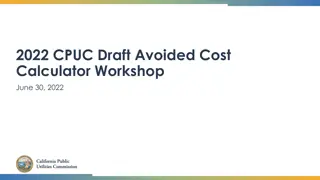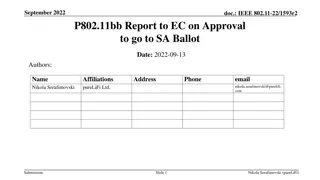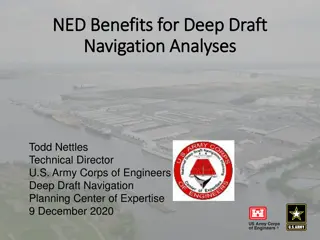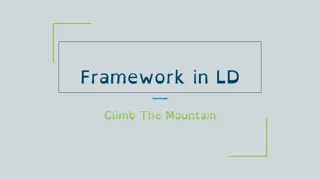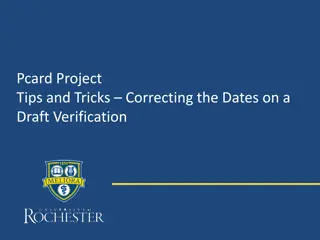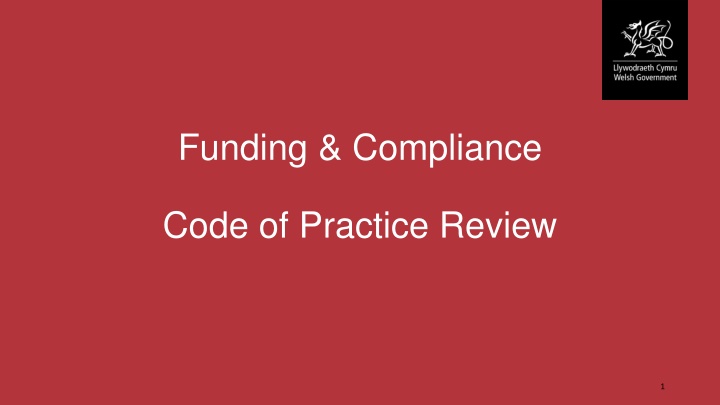
Review of Funding Compliance Code: Improving Funding in Wales
Explore the review of the Funding & Compliance Code of Practice in Wales, aiming to enhance funding programs through better awareness, modernization, and accessibility. The review process involves creating a new code with key stakeholders, focusing on 5 draft principles and underlying themes like independence, transparency, and trust.
Download Presentation

Please find below an Image/Link to download the presentation.
The content on the website is provided AS IS for your information and personal use only. It may not be sold, licensed, or shared on other websites without obtaining consent from the author. If you encounter any issues during the download, it is possible that the publisher has removed the file from their server.
You are allowed to download the files provided on this website for personal or commercial use, subject to the condition that they are used lawfully. All files are the property of their respective owners.
The content on the website is provided AS IS for your information and personal use only. It may not be sold, licensed, or shared on other websites without obtaining consent from the author.
E N D
Presentation Transcript
Funding & Compliance Code of Practice Review 1
Why? What? How? 2
Background The Code is an integral part of the Third Sector Scheme and it sets out principles that underpin Welsh Government funding for the third/voluntary sector and what Welsh Government expects from the sector in return. Ensuring fair access to public funding both directly from Government and indirectly through funding Government provides to public bodies to enable the sector to support our communities in Wales. 3
Why? The Code was published in 2014, since that date the funding and legislative landscape in which the third/voluntary sector and funding bodies operate has changed completely. Despite being a key mechanism the awareness about the Code in both public and third/voluntary sector is poor. 4
What? The Funding and Compliance Sub-Committee decided it is time to review the Code on behalf of the Third Sector Partnership Council and the Minister for Social Justice. The outcome will be a new Code that all key stakeholders adopt. To raise awareness of the new Code throughout the third /voluntary sector and with public sector funding bodies. 5
How? The review process will use the five ways of working as an operating framework, ensuring the third/voluntary and the public sector have an equal voice in the process. We will co-produce a new Code with all stakeholders including those bodies we want to see captured by the Code. The engagement process will take some time to complete. 6
Aim of the Review We want to create a Code that is widely used to improve the design and delivery of funding programmes in Wales in order to have a greater impact on our communities. To achieve this, we need to Make the Code more accessible and promote wider awareness of the Code. Modernise and simplify the language. The new document will be a 1 page summary of 5 principles with an overarching aim with supporting technical guidance sat behind in a shorter document. 7
The Five Draft Principles Equity Early & Continuous Improvement Valuing & Outcomes Appropriate Funding Basis Flexibility 8
Themes which run through the Principles Recognition of Independence Transparency Trust Appropriate Language Capacity to Engage Safety 9
Overarching Aim How we can improve the design and delivery of funding programmes in Wales in order to have a greater impact A set of principles that when applied together create an enabling and empowering environment for the creation of better policy, better service design and better outcomes for the communities of Wales. This will also lead to the improved sustainability of the third/voluntary sector organisations delivering them. These principles are designed to apply to both funders and funded bodies equally in a context of mutual trust, transparency, and safety. Ensuring third/voluntary sector organisations and funding bodies are equal partners in any funding conversation within the bounds of managing public money. The principles are designed to be viewed and used as an interconnected, virtuous circle of behaviour not as stand-alone activities. 10
Equity Ensure fairness of access for all - creating a funding environment that is proportionate, remove barriers to inclusion and builds support. Our communities need to have a range of accessible services to meet a variety of individual and collective needs, we must therefore ensure fairness of access to funding. This means having funding practices that are proportionate, removing barriers to inclusion and building support for organisations who find it difficult to engage in funding processes. This means creating a funding environment that engenders trust, promotes transparency and mutual respect, where it is safe to speak the truth without fear. Where possible and appropriate this means employing processes that encourage collaboration. 11
Early & Continuous Dialogue Ensure meaningful and regular engagement between funders and voluntary sector bodies To ensure services are better designed and delivered for end beneficiaries and are therefore more likely to solve the right problem and deliver the right outcomes. Building in meaningful engagement between the funder and third/voluntary sector bodies (and other key partners) at the earliest possible point in the funding process (including policy development and delivery design) and frequently throughout its lifetime. Success depends on creating trusted, long-term partnerships /relationships of equals with joint objectives through open and transparent channels of communication. 12
Valuing & Outcomes Ensure we are basing our funding decisions on a broad consideration of social, environmental and economic value and outcomes We should base our funding decisions where possible on a shared identification and analysis of the issues, the outcomes we want to see and the potential ways of achieving them together. This means not always basing our funding decisions solely on the financial and competitive processes. Having a broader consideration of social and environmental value and outcomes with a greater emphasis on partnership working and collaboration where appropriate. 13
Appropriate Funding Basis Ensure funders consider all options and choose the appropriate mechanism(s) that will effectively deliver agreed outcomes throughout the funding period Building in time to understand all the options in order to choose the best funding basis is key, especially if you re considering the delivery of policy and the factors that will provide successful outcomes over the long-term. These factors include the sustainability, staff, skills and capacity of delivery organisations, as well as the enabling of partnership working and collaboration, and where possible ensuring that resources are focused on delivering outcomes not burdensome processes. 14
Flexibility Ensure that if evidence or circumstances support the need, both funder and funded organisations can suggest adjustments for joint agreement Things will inevitably change during the lifetime of your funding relationship (especially if it s long-term). There needs to be a willingness from both the funder and funded organisation to jointly agree to adjustments in outcomes, activities, timings, funding patterns if evidence, or circumstance, suggest a need for re-evaluation. This should be achieved through an agreed and robust process which is decided at the start of the funding agreement. 15
Early & Continuous Dialogue Ensure meaningful and regular engagement between funders and voluntary sector bodies. Valuing & Outcomes Ensure we are basing our funding decisions on a broad consideration of social, environmental and economic value and outcomes. Equity Ensure fairness of access for all - creating a funding environment that is proportionate, remove barriers to inclusion and builds support. Overarching Aim How we can improve the design and delivery of funding programmes in Wales in order to have a greater impact. Appropriate Funding Basis Ensure funders consider all options and choose the appropriate mechanism(s) that will effectively deliver agreed outcomes throughout the funding period. Flexibility Ensure that if evidence or circumstances support the need, both funder and funded organisations can suggest adjustments for joint agreement. 16
How can you help? You can help by Telling us what is important to you Are the draft principles reflecting what you think the funding relationship should look like Tell us what you d change and remind us what we have forgotten We will copy these slides to you, send them to anyone in your Networks who may be interested 17
Please provide any feedback to WG colleagues at: thirdsectorqueries@gov.uk Diolch / Thank You 18

